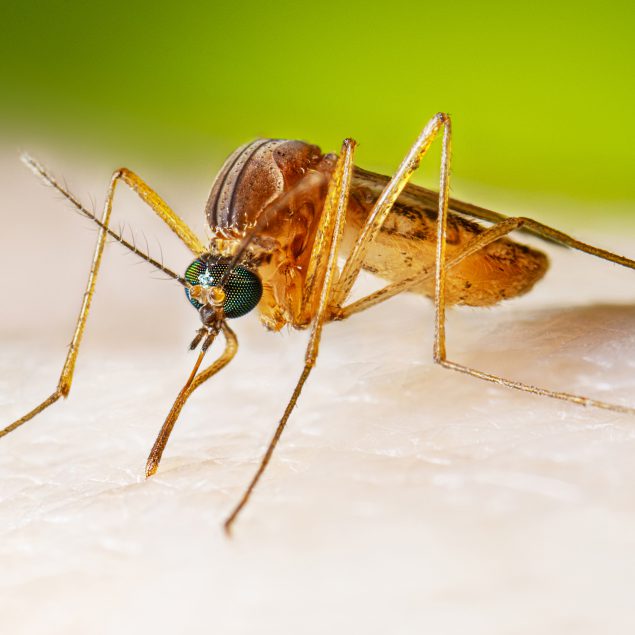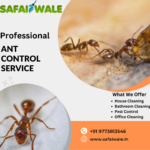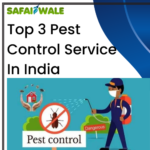
Mosquitoes are the most bothersome pest and also carries potential disease, thus having them inside your house is a serious risk. Fortunately, there are a few ways that work well for eradicating mosquitoes inside your house. We’ll go over a number of methods in this in-depth tutorial to eradicate mosquitoes from your home and make sure your entire family is safe and can live happily.
To properly manage mosquito control indoors, it is imperative to comprehend their behaviour before attempting any removal techniques. Because they are drawn to human body heat, carbon dioxide, and some scents, indoor environments with these features are ideal mosquito breeding grounds.
A combination of preventive steps, natural repellents, chemical control techniques, and, if needed, expert aid is needed to eradicate mosquitoes from within your home. You may have a healthy and comfortable living space for you and your family by eradicating mosquitoes and controlling the behaviour via the efficient tactics or methods.
How to get rid of mosquitoes?
Are you having trouble to eradicate mosquitoes in your house? This widespread issue, mostly in hot regions like India, not only causes severe irritation but also puts people’s health at stake for sickness like malaria and dengue. Our site provides practical methods and best mosquito killer to repel these bothersome insects, guaranteeing that both your interior and outdoor areas are mosquito-free.
When compiling a list of various mosquito remedies hacks, keep in mind that you can use either natural or chemical solutions. Because they are chemically sensitive, some individuals would rather eliminate mosquitoes at home naturally! Let’s examine some of the greatest tips for permanently keeping mosquitoes at bay!
1- Chemical Repellents
Using chemical repellents is the most popular approach and unquestionably the best mosquito killer way to lessen insects at home. Some are in the shape of a spray or mosquito spraying product that you may use on windows, in the kitchen, bathroom and other areas where you can see mosquitoes. The greatest solution for eliminating mosquitoes in the house is to use chemical repellents for mosquito control.
2- Plants that act like mosquito repellent
Making an environment that mosquitoes detest is the key to never having any in your home. Use of naturally occurring plants that are effective mosquito repellents or mosquito spraying is one of the finest methods for getting rid of mosquitoes in the home. Marigold, mint, lemongrass, and tulsi are easily obtained indoor mosquito-repelling plants that you should have about the house.
3- A Mixture of Foods That Mosquitoes Detest
This is the day you’ve been waiting for if you’ve been wondering how to get rid of mosquitoes with common household products! The odour of citrus and cloves is strongly disliked by mosquitoes, as is widely known. One of the simplest and most reliable natural cures for mosquito control is to infuse cloves into lemons or use best mosquito killer. Should these be unavailable at your residence, you may smash several garlic cloves and gather the juice into a bottle. The room will become mosquito-free right away if this juice is sprayed around the windows. See below for comparable and less complicated Indian home methods for eliminating mosquitoes, such as mosquito spraying.
4- Soapy Solution
This solution is for you if you want to know how to kill mosquitoes at home without having to go after every bug in the house! Mosquitoes prefer to remain near bodies of water, so it’s easy to catch them by luring them to approach areas with standing water. The secret is to maintain various parts of your house with soapy water and a thick layer of foam on top. This mosquito hack is the finest way to deal with insects and flies at home since it traps mosquitoes once they come into touch with the soapy water.
5- Put Essential Oils on Your Skin
Too many areas of India struggle with issues relating to mosquitoes. For those who are unaware of keeping mosquitoes out of their houses despite your best strategies, the most effective natural repellent of mosquito is to massage oils including tulsi and camphor onto the skin. If you stay near jungle or in a hilly area, the scent of these essential oils is the best mosquito killer will keep mosquitoes away, making it a right way to get rid of such creatures at home.
How to Keep Mosquitoes Out Using Alcohol
There are moments when you need to come up with a novel yet practical mosquito removal strategy for your house or best mosquito killer. Beer and even rubbing alcohol are examples of alcohol that is reasonably simple to employ to keep mosquitoes out of the house. Mosquitoes find the smell of alcohol repellent and will quickly flee from an area where it is present. The best results from this chemical mosquito repellent come from keeping an alcohol-filled plate close to the window.
Mosquitoes Detest Wind and Breeze
In certain cases, treating mosquitoes at home with natural or chemical therapies might not be feasible. How can you get rid of mosquitoes in such a situation? It’s simple, just switch on the room’s fan to its fastest mode. Mosquitoes dislike locations with strong breezes and winds because they can’t fly at such windy room. So, it beneficial to switch on the fan and sleep peacefully at your home.
Stop Breeding
Covering water in buckets, pots, and utensils will stop mosquitoes from breeding, which is an excellent way to combat mosquitoes at home. Unnoticed water storage might develop into a haven for disease outbreaks. To get rid of these bugs, make sure kitchen water containers are safely covered.
How to Manage Mosquitoes Away from Your House?
The goal of mosquito pest control outside your house is to both decrease their population and keep them out of indoor areas. The following are some crucial tactics:
- Finding Resting Spots: During the day, mosquito pest control usually take a nap in dark, damp areas such as under patio furniture or in carports and garages.
- Apply Outdoor Insect Spray: Choose insecticides that are designed to eradicate mosquitoes. The best results from these sprays come from using them where mosquitoes congregate.
- Observe safety precautions: Observe the directions on the label of any insecticide you use. Application done correctly guarantees safety and efficacy for both you and the surrounding area.
By putting these measures into practice, you may drastically reduce the number of mosquitoes surrounding your house, making the outdoors more cosy and secure. Learn how to do mosquito pest control and get rid of mosquitoes at home using our tried-and-true methods, which include natural remedies and repellent sprays, if they are invading your space.
Apply repellents and sprays for insects all over the house
The mosquito pest control can be done outside and inside the home with insect sprays and repellents. It’s crucial to use these products in accordance with the instructions given in the bottle.
- When there are visible mosquitoes in your home, use “knockdown” fly spray.
- Use mosquito vaporizers or diffusers that plug in and come with repellent treatment pads in enclosed outdoor spaces like decks and verandas. As soon as the space is empty, these need to be turned off.
- Apply a mosquito spray or repellent that works properly on all external parts of your skin, such as diethyltoulamide (DEET) or picaridin.
- When you’re outside, use mosquito coils. These need to be watched over constantly. In areas where mosquitoes like to rest, use a long-acting surface spray if the mosquito pest control or mosquito population is especially bad. Spray dense, shady trees and shrubs close to your house to target these regions. Steer clear of using these products close to fish ponds. When using any insecticide, make sure you follow the directions for safe usage.
Reduce the amount of mosquito breeding in your garden and yard
Mosquitoes that breed in your own garden and yard are likely to bite you! Even even the slightest amounts of water, mosquitoes can reproduce. Eliminate standing water to prevent mosquito reproduction.
1- Trash up your yard and get rid of anything that can collect water, like old tyres, pots and containers.
2- To prevent water from collecting, cover or tip over trailers, wheelbarrows, boats, tools, and kid’s toys.
3- Maintain clear drains and gutters to allow water to flow freely.
4- Fix leaky faucets.
5- At least once a week, and more frequently in really warm weather, change the water in pet drinking bowls, bird baths, and vase arrangements.
6- To absorb water that collects around potted plants, surround them with sand.
7- When not in use, make sure swimming pools are covered securely or kept in good condition and with chlorine. In empty swimming pools, do not allow water to collect.
8- Maintain fishponds neatly by adding little vegetation to their borders.
9- Reduce the amount of space where mosquitoes rest by keeping gardens and lawns kept short.
Is It Possible to Remove Mosquitoes?
Prior to debating the advantages or disadvantages of eliminating mosquitoes from the earth, we ought to ask ourselves whether such a task is really feasible. To put it briefly, the response is a very tentative maybe. There are now three methods available for eliminating mosquitoes in a particular area. Of them, two are comparatively low-tech. The third alternative is almost science fiction in its high-techness.
The Low-Tech Remedies
Eliminating mosquito breeding grounds is the first step in eliminating mosquitoes in a localised region. For their larvae to develop and lay their eggs, mosquitoes need warm, standing water. Thus, removing standing water is frequently the first step in getting rid of mosquitoes. There are literally thousands of locations where there is sufficient water for mosquito eggs to be laid. Just enough water is needed to fill the cap of a soda bottle. Because of this, it is very difficult to eradicate mosquito breeding grounds entirely. Reducing standing water is still a useful strategy for weakening and mosquito control populations in the area, though.
Using insecticides is the second best strategy for eradicating mosquitoes in a particular location. To manage mosquito’s biggest populations, a large amount of insecticides are used. Among a class of mixture known as pyrethroids, the most widely used insecticides are types of permethrin. Usually, permethrin is combined with water or oil and sprayed on plants or other places where mosquitoes could congregate. By getting into their central nervous system, it eliminates mosquitoes. Malathion is another insecticide, used for mosquitoes; it is an organophosphate that also damages the central nervous system. Insecticides known as larvicides are also used directly to standing water to minimize mosquito larvae from breeding.
Mosquito spraying has a limited effectiveness. Insecticides sprayed disintegrate quite quickly, especially in the presence of rain. A new application may be necessary once the optimal three or four weeks have passed. Mosquitoes can get resistant to insecticides, which is another issue with them. Mosquitoes resistant to insecticides already exist in some places. Because of this, spraying is an effective but insufficient remedy.
The High-Tech Method
Low-tech mosquito control methods can be somewhat successful, but they seldom eradicate mosquitoes over a wide area. However, researchers have been developing high-tech mosquito exterminator substitutes that can be almost 100% successful in an area the size of a town. Though it might sound like science fiction, scientists have created a number of genetically altered mosquitoes that can quickly sterilise a natural population after infiltrating it.
One technique that has been applied as mosquito exterminator is the creation of deadly mutant mosquitoes. In a laboratory, mosquitoes are produced using water containing a chemical that neutralises the mutation. However, after being released into the wild, the mosquitoes mate and have children, but the mutation kills the children before they can procreate and give rise to another generation. This has led to a 90% reduction in mosquitoes across a wide area in field experiments. Interestingly, such numbers usually hold season to season, meaning that there aren’t many new mosquitoes in the following mosquito season.
CRISPR genetic editing
Using the CRISPR genetic editing technology is one method scientists are employing to produce mutant mosquitoes or as mosquito exterminator. With the help of this editing tool, any portion of an organism’s DNA can be easily edited and replaced with unique DNA made in a lab. This holds true for more than simply mosquitoes. CRISPR is applicable to and has been applied to a broad range of organisms. It may possibly be utilised to treat inherited illnesses like muscular dystrophy in people.
A gene that is reproduced In the sperm and egg of mosquitoes has been put into them by scientists using the CRISPR method. It sterilises the female but leaves the male unaffected. The guys can now carry on spreading the genetic code because of this. A batch of eggs is laid by the natural female after mating with a mutant male; the males are not sterile, but all of the females are. While the males carry the gene to more naturally occurring females, the females die before reproducing. The majority of female mosquitoes soon begin to deposit eggs with sterile females, at which point there is no more generation and mosquito reproduction comes to an abrupt end.
Is this a wise decision?
The prospect of complete destruction becomes plausible with this strategy of genetic mutation and final elimination. However, it’s not that easy. This strategy usually works within a small geographic area, where a population can disperse the mutation and finally go extinct. Applying this technique worldwide would need a significant amount of work, while it is believed that areas with high prevalence of mosquito-borne illnesses could benefit from it. The fact that this is limited to one species at a time presents another problem. Scientists would need to produce mutant men for every new species in order to breed into that population and wipe it out.
Although it is improbable that all mosquitoes on the earth could be eradicated, what about eliminating mosquitoes in a certain area? The first outcome would be the preservation of hundreds of thousands of lives, a large number of them young. Almost one million people die each year from diseases spread by mosquitoes. Eliminating the mosquitoes that transmit such illnesses appears to be a major victory for global public health. However, there are unforeseen repercussions everywhere. Though only about 100 species carry diseases that harm humans, there are approximately 3,500 species of mosquitoes on the globe.
Bottom Line
The majority of scientists appear to believe that mosquitoes have a relatively little influence in the environment. No one organism exists that only consumes mosquitoes for food. Although a lot of animals eat mosquitoes, this makes up a very small portion of their diets. Eliminating mosquitoes from the food chain would therefore have minimal impact. Eliminating mosquitoes has another, more concerning consequence, though.
In the ecosystem, mosquitoes serve as both competitors and food. Removing one organism from an environment opens up space for other organisms to flourish. Regarding mosquitoes, we are unsure of what would take the place of a completely destroyed population. Could the mosquitoes they replace be worse than the new population? The truth is that we are merely ignorant. Therefore, even if eliminating mosquitoes—at least in one area—may seem like a great idea, it’s still uncertain what the end result might be. Therefore, even though eliminating at least some mosquito populations has enormous potential for improving global health, some scientists advise proceeding cautiously and gradually.
Frequently Asked Questions about Mosquitoes
One of the main causes of homes turning into hubs for illnesses like dengue and malaria is mosquito breeding. When left unattended and exposed to water, such as in empty flower pots, buckets, kitchenware, etc., mosquitoes typically multiply. Avoiding standing water and using repellents in crevices are the best ways to prevent mosquitoes from reproducing.
You can employ a variety of natural cures in your home to get rid of mosquitoes. Many are really straightforward and simple to carry out. Keeping soapy water, lemons, and garlic cloves near windows are some sure-fire all-natural ways to drive away mosquitoes. You may use mosquito exterminator.
The most reliable method for eliminating mosquitoes at home is to employ mosquito exterminator like chemicals, including anti-repellent creams or sprays. Electric rackets are another option; these get rid of insects as soon as they come into contact with the electrocuted net.
Yes, one of the least and quickest expensive method to get rid of mosquitoes at house is to use camphor. The top way to get this is to store the camphor tablets in rooms mix them together with water and keep it aside. Because they cannot tolerate the fragrance of camphor, insects will quickly leave the room.
If you have a mosquito problem at home, essential oils are ideal for your home. They are natural and essential methods to keep mosquitoes out of the house. You can use essential oils such as lavender, cinnamon oil, tea tree oil, thyme oil, soybean oil, and Greek catnip oil.
In order to decrease mosquito populations outside, remove any standing water and apply repellents such as citronella candles or sprays.
The best strategy combines natural predators such as bats with mosquito traps and keeps the area free of standing water and dirt.
Use screens, close windows and doors, and place mosquito nets or indoor-safe repellents around sleeping places.
Apply personal insect repellents, dress in light colours, and stay inside between the hours of dark and dawn when mosquito activity is at its highest.
Yes, one of the easiest ways to get rid of mosquitoes is to use indoor-safe insecticides and electric mosquito zappers.
The best ways to lower outdoor mosquito populations are to use insecticides on water bodies, install bug zappers, and set up mosquito traps.
Grow plants that ward off mosquitoes, such as lavender and marigold, and apply natural repellents like eucalyptus or lemon oil.



